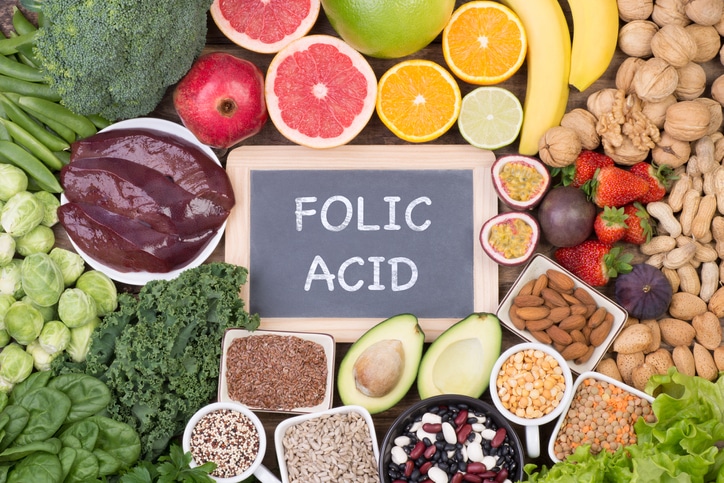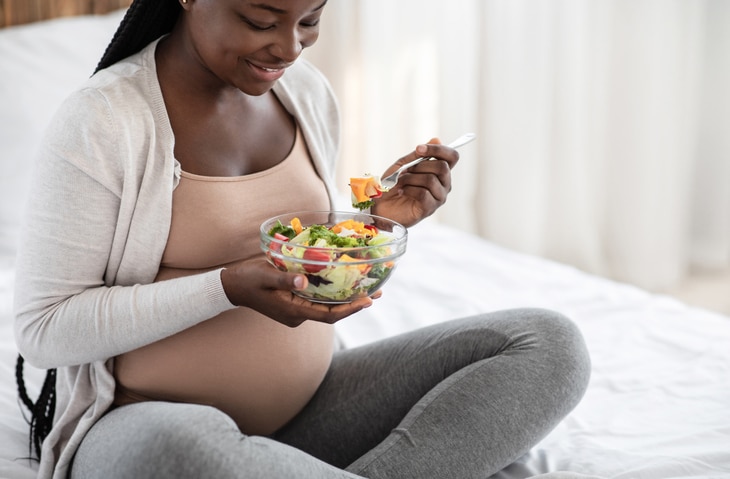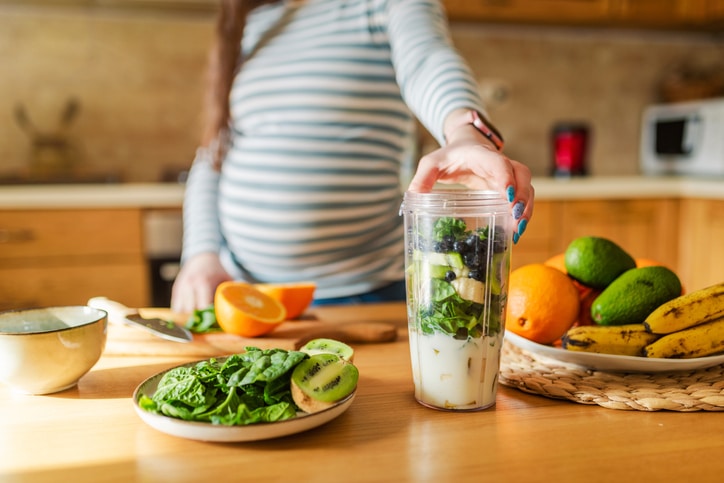Most women understand that eating a balanced diet becomes twice as important during pregnancy because they’re eating for two, but when it comes to a baby’s brain development, two nutrients are especially important: folate and choline.
Getting enough of both, and everything else a developing baby needs, depends on eating a “rainbow of nutrients,” says Bhavisha Bhakta, DO, OB/GYN on the medical staff at Methodist Mansfield Medical Center, whether you adopt the tried-and-true Mediterranean diet or another meal plan filled with vibrant fruits and vegetables, whole grains, lean meat and seafood, beans and legumes, and healthy fats.
“Think of it as painting a beautiful picture with every meal, where each color adds a stroke of health and joy,” she says.
Let’s get the broad strokes of prenatal nutrition from Dr. Bhakta, including healthy diets to consider and what foods to avoid.

FOLATE AND FOLIC ACID
Folic acid is the synthetic form of folate, an essential nutrient that can be found in leafy greens like spinach and lettuce, as well as in asparagus, avocados, and Brussels sprouts.
Otherwise known as vitamin B9, folate plays a critical role in cell growth, so it’s no wonder it’s so important to a baby’s development. Low folate levels have been linked to birth abnormalities, most notably neural tube defects.
OB-GYNs like Dr. Bhakta recommend pregnant women get at least 400 micrograms of vitamin B9 daily. However, it’s better to consume it in your diet rather than in a supplement or through processed food because the process of converting it is slow and inefficient.

WHY CHOLINE IS CRITICAL
Unlike vitamin B9, most people don’t get enough choline in their diets: 425 milligrams for women (500 mg for men), 450 mg for pregnant women, and 600 mg for breastfeeding women.
“Choline also plays an important role in brain development,” Dr. Bhakta says.
Found in milk, soy products, egg yolks, chicken and fish, peanuts, and vegetables like broccoli and cauliflower, choline is essential to brain health – for both mother and baby.
“Incorporate foods rich in omega-3s like salmon, eggs, flaxseed, and walnuts to help build a brilliant little star,” Dr. Bhakta advises.
Our livers create a small amount of choline, but more is necessary to accomplish its many tasks, from clearing cholesterol from the liver to producing acetylcholine, a neurotransmitter that helps regulate memory, mood, and muscle movement.

RAINBOW OF NUTRIENTS
While most women take supplements during their pregnancies, there’s no substitute for getting the nutrients you need directly from the foods you eat.
Not only has the Mediterranean diet been found to boost fertility, but it can also nurture your baby once you are pregnant. The diet can even help prevent complications like pre-eclampsia, otherwise known as high blood pressure during pregnancy, according to a 2022 study in the Journal of the American Heart Association.
The diet, and its offshoot the DASH diet, provides the nutrients a pregnant woman and her child need, including plant-based proteins, anti-inflammatory flavonoids, and vitamins C and E.
What’s more, it’s abundant with leafy green vegetables like spinach, asparagus, Brussels sprouts, and broccoli, which contain the critical nutrients iron and folic acid.

FOODS TO AVOID
Food aversions and cravings are a natural part of pregnancy, but Dr. Bhakta warns there are some foods and drinks better off avoided.
Most women know to avoid alcohol during pregnancy, but unpasteurized milk and cheese, as well as undercooked meats, are just as risky. So, too, are energy drinks and other highly caffeinated beverages, Dr. Bhakta explains.
“Energy drinks have a very high content of caffeine and sugar,” she says, considering a single bottle can contain 300 milligrams of caffeine or more, well over the 200mg maximum daily recommended allowance for women who are pregnant or hoping to become pregnant.
Instead, Dr. Bhakta recommends protein shakes and hydrating herbal teas, along with fresh fruit and vegetable smoothies that are rich in vital nutrients, what she calls “liquid sunshine.”
Giving in to cravings is OK within reason, Dr. Bhakta says, so long as you keep in mind who’s sharing the junk food and all those midnight snacks.
“Your body is conducting a harmonious orchestra,” she says. “Take heed to its rhythms and occasionally indulge, but remember, your little one has a nourishing rhythm of its own.”






